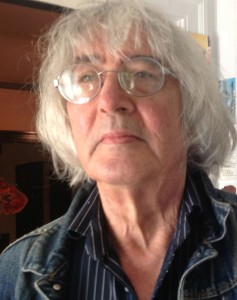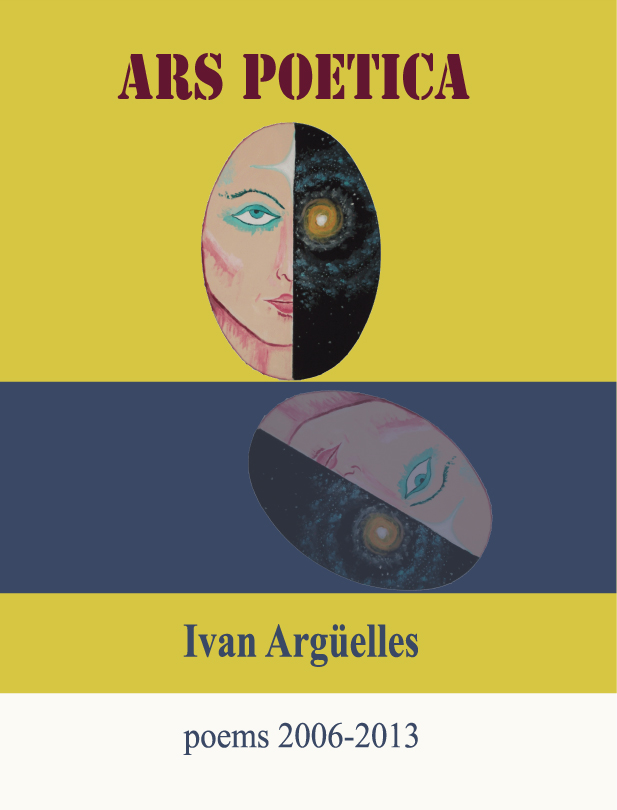Ivan Argüelles is an American innovative poet whose work moves from early Beat and surrealist-influenced forms to later epic-length poems. He received the Poetry Society of America’s William Carlos Williams Award in 1989 as well as the Before Columbus Foundation’s American Book Award in 2010. In 2013, Argüelles received the Before Columbus Foundation’s Lifetime Achievement Award. For Argüelles the turning point came with his discovery of the poetry of Philip Lamantia. Argüelles writes, “Lamantia’s mad, Beat-tinged American idiom surrealism had a very strong impact on me. Both intellectual and uninhibited, this was the dose for me.” While Argüelles’s early writings were rooted in neo-Beat bohemianism, surrealism, and Chicano culture, in the nineties he developed longer, epic-length forms rooted in Pound’s Cantos and Joyce’s Finnegans Wake. He eventually returned, after the first decade of the new millennium, to shorter, often elegiac works exemplary of Romantic Modernism. Ars Poetica is a sequence of exquisitely-honed short poems that range widely, though many mourn the death of the poet’s celebrated brother, José. Andrew Joron: “One of the most visionary poets of our time. Ivan Argüelles is that rarest of poets: one who practices at the very precipice of being.”
Read Christopher Bernard ‘s review of Ars Poetica in Synchronized Chaos.
Ars Poetica is not a sonnet sequence—despite the resemblances—but a sequence of “soundings.” Each poem is carefully dated: it was precisely at thi
Ivan Argüelles has produced a body of work rooted in his Mexican-American heritage, but it is unlike anything anyone in any ethnic group has produced. Initially grounded in the Spanish variety of Surrealism, his poetry swiftly began to transform itself into an instrument that communicates before it is fully—or sometimes even partially—understood. It is simultaneously “difficult”—restless, full of “references”—but also immediate, visceral. It cannot be “explicated.” Moving beyond Catholic Mexico/Catholic Spain into the even darker roots of Catholicism, Argüelles’ imagination explores the deeply pagan, deeply anarchic ground of an “other” tradition. Urban, sophisticated, learned in many languages (“tongues”), the poet creates a profane, stunningly transcendent, enormously erotic body of work that would probably have had him burned at the stake in the Middle Ages. Poet John M. Bennett insists that Argüelles’ work “is not really ‘literature’ as the term is commonly understood”: we must read it “with a new mind-set”; “one has to allow oneself to be ‘drowned’ in the ocean of this stunning and protean work and be receptive to all the ambiguities and contradictions it contains.” Argüelles’ own word for his work is “Enigma”; another way to describe it is to insist that it is a mystical consciousness which has removed itself from any known religion: San Juan de la Nada, poetry as that old black magic. Our critical categories fall by the wayside as we attempt to tell people what it is about this work that so moves us, that so “charms” us with its impossible, totally “inconsiderate” power and darkness:s moment that these words occurred to me; it was at this moment that I breathed these words in (“inspiration”). Remembering Wordsworth, we might call these poems spots of time.
“my” inspiration, year 1624
where is verdant luster, where
is emerald bay, not carbonized,
distance is the symbol, smoking
“that” famous cigarette, where
sidewalk turns into heaven’s gate,
a remark in passing, lowering
head in gesture of shy naiad,
are there waters so crystalline?
distance is the signal, remote
the utter language of the Soul,
do the two recognize the Other?
++++++++++++++++++++++++++++++++
I don’t remember what it is
(“my inspiration”)
We can call such passages “chaotic”—which they both are and are not. In its incredible swirl of sexuality, erudition, and massive longing, Argüelles’ poetry asks the reader again and again, “You think you have an ego? Try this.” But if we haven’t an ego, what do we “have”? What the entity Argüelles calls his “Muse” has given him: an amazing language that simultaneously attracts and betrays us at every possible moment: “a music emerges a riot.”
———


